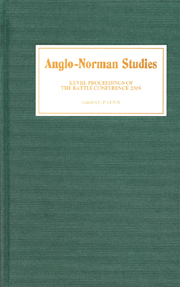Book contents
- Frontmatter
- Contents
- LIST OF ILLUSTRATIONS, MAPS, AND TABLES
- EDITOR'S PREFACE
- ABBREVIATIONS
- Inside the Anglo-Norman Family: Love, Marriage, and the Family (R. Allen Brown Memorial Lecture)
- Land Tenure and Royal Patronage in the Early English Kingdom: A Model and a Case Study
- The Homilies of a Pragmatic Archbishop's Handbook in Context: Cotton Tiberius A. iii
- Robert de Vaux and Roger de Stuteville, Sheriffs of Cumberland and Northumberland, 1170–1185
- The Common Steeple? Church, Liturgy, and Settlement in Early Medieval Lincolnshire
- The Question of Masculinity in William of Malmesbury's Presentation of Wulfstan of Worcester
- Share and Share Alike? Bishops and their Cathedral Chapters: The Domesday Evidence
- Dunstan and Monastic Reform: Tenth-Century Fact or Twelfth-Century Fiction?
- Domesday Now
The Question of Masculinity in William of Malmesbury's Presentation of Wulfstan of Worcester
Published online by Cambridge University Press: 12 September 2012
- Frontmatter
- Contents
- LIST OF ILLUSTRATIONS, MAPS, AND TABLES
- EDITOR'S PREFACE
- ABBREVIATIONS
- Inside the Anglo-Norman Family: Love, Marriage, and the Family (R. Allen Brown Memorial Lecture)
- Land Tenure and Royal Patronage in the Early English Kingdom: A Model and a Case Study
- The Homilies of a Pragmatic Archbishop's Handbook in Context: Cotton Tiberius A. iii
- Robert de Vaux and Roger de Stuteville, Sheriffs of Cumberland and Northumberland, 1170–1185
- The Common Steeple? Church, Liturgy, and Settlement in Early Medieval Lincolnshire
- The Question of Masculinity in William of Malmesbury's Presentation of Wulfstan of Worcester
- Share and Share Alike? Bishops and their Cathedral Chapters: The Domesday Evidence
- Dunstan and Monastic Reform: Tenth-Century Fact or Twelfth-Century Fiction?
- Domesday Now
Summary
One of the more unusual explanations for English defeat in 1066 appears in the Life of St Wulfstan. In it Bishop Wulfstan lambastes English noblemen for their luxurious style of living as well as their long flowing hair and he warns them that this will lead to disaster if they do not mend their ways. Not one to be accused of being all talk and no action, Wulfstan proceeds to cut the hair of all those that he can with a special knife which he kept to hand precisely for this purpose.
Anyone who thought it worth objecting he would openly charge with effeminacy [mollitia], and openly threaten them with ill: men who blushed to be what they had been born, and let their hair flow like women, would be no more use than women in the defence of their country against the foreigner. No one would deny that this was shown to be very true that same year when the Normans came.
Wulfstan's prophetic awareness of the coming of the Normans is particularly striking not only because of the wonderful image of Wulfstan as a barber but also because of its explicit use of a gendered language. Men here are compared to women with their long flowing hair and are accused of effeminacy, which implies that they were not acting as men should. Is it also the case that Wulfstan, a cleric reprimanding laymen, is in turn being cast as the ‘real man’ here? He is certainly presented as a figure of power and authority and as a prophet to the English. Is he also a hero in the sense of a masculine ideal? This passage suggests that a gendered reading of the text, with especial reference to the presentation of Wulfstan, may be worth exploring further.
- Type
- Chapter
- Information
- Anglo-Norman Studies 28Proceedings of the Battle Conference 2005, pp. 124 - 137Publisher: Boydell & BrewerPrint publication year: 2006



